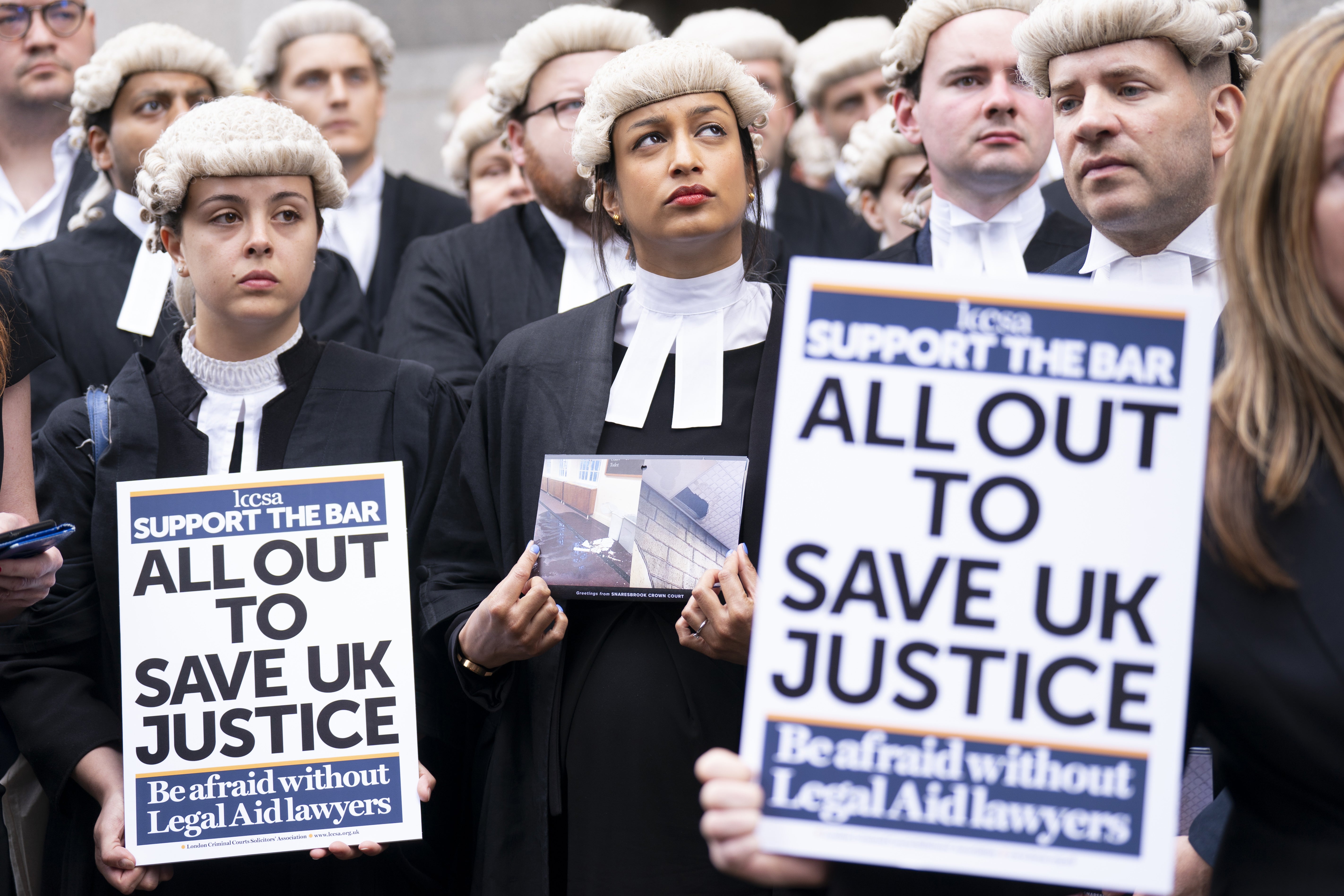At least 700 court cases disrupted in first two days of barristers’ strike as action set to escalate
Three days of action are due to take place next week, as some trials delayed until 2023

Your support helps us to tell the story
From reproductive rights to climate change to Big Tech, The Independent is on the ground when the story is developing. Whether it's investigating the financials of Elon Musk's pro-Trump PAC or producing our latest documentary, 'The A Word', which shines a light on the American women fighting for reproductive rights, we know how important it is to parse out the facts from the messaging.
At such a critical moment in US history, we need reporters on the ground. Your donation allows us to keep sending journalists to speak to both sides of the story.
The Independent is trusted by Americans across the entire political spectrum. And unlike many other quality news outlets, we choose not to lock Americans out of our reporting and analysis with paywalls. We believe quality journalism should be available to everyone, paid for by those who can afford it.
Your support makes all the difference.At least 700 court cases were disrupted by the first two days of a barristers’ strike, and the number is expected to rise as the action continues across England and Wales.
Next week will see members of the Criminal Bar Association (CBA) walk out for three days, and the action is due to escalate to four days the following week, and then five if their demands are not met.
A Ministry of Justice source said that on Monday and Tuesday, roughly 700 hearings were disrupted by the strike.
But the real number affected is thought to be higher, as some judges decided not to list cases in advance in the knowledge that defence barristers would not be turning up.
Defendants and juries assembled for trials that were left to run, only to see the defence bench empty as judges were forced to adjourn hearings.
A judge at Swansea Crown Court said that courts would have to “take every day as it comes” going forward, and that trials cannot proceed with defence barristers absent.
The Independent has been told that some adjourned trials, including a child abuse case and other sensitive offences, have not yet been rescheduled and are expected to be delayed until 2023 as a result of the action.
The walkouts were sparked by a dispute with the government concerning legal aid, which pays the fees for representing defendants who cannot afford to cover the costs themselves.
CBA members are also refusing to accept new cases and take on “return work” by picking up court hearings for colleagues whose cases are overrunning.
Barristers vowed to return to the picket lines on Monday, after the government confirmed that fees would rise by 15 per cent from the end of September.
The Ministry of Justice said that criminal solicitors will also receive a 15 per cent increase for their work in police stations and magistrates’ and youth courts, and that other proposed changes to legal aid would be looked at.
Justice minister James Cartlidge said: “Our energetic efforts to tackle the courts backlog are working but the strike action by criminal barristers threatens all that progress, despite the very generous pay offer on the table.
“The typical criminal barrister will earn an extra £7,000 a year from September, so I urge the Criminal Bar Association to accept this offer to stop victims having to wait longer for justice.”

A CBA spokesperson said the figure was not effectively a 15 per cent pay rise for barristers because of payments to solicitors, expenses, tax, inflation and losses in earnings caused by court closures during the early stages of the pandemic.
An increase to criminal legal aid funding of “at least 15 per cent above present levels” was the recommendation of an independent review published in December.
Its author, Sir Christopher Bellamy, said the review had been announced three years previously and that underlying problems had been flagged “for many years before that”.
“There is in my view no scope for further delay,” he added. The CBA said it waited 105 days for a government response to the recommendations and that several had not been adopted.
The increase will not be retrospective, meaning that fees for the backlog of more than 58,000 outstanding crown court cases are paid at old rates.
A National Audit Office report found that the backlog was rising before the Covid pandemic because the government limited the number of sitting days on which courts could run. It has subsequently lifted the cap.
A spokesperson for the CBA warned that the number of criminal barristers was falling because they “simply cannot sustain the assault on their remuneration and working conditions”.
“There are simply too few criminal barristers to prosecute, to defend and even to provide judges we all need to crack a record backlog and ensure victims of crime and the accused are not left in agonising limbo,” he added.
”The days of action planned for next week are unchanged by the latest announcement as the ballot on escalating our action remains.“



Join our commenting forum
Join thought-provoking conversations, follow other Independent readers and see their replies
Comments